高中英语Unit1FestivalsaroundtheworldSectionⅡWarmingUp
- 格式:doc
- 大小:278.00 KB
- 文档页数:4
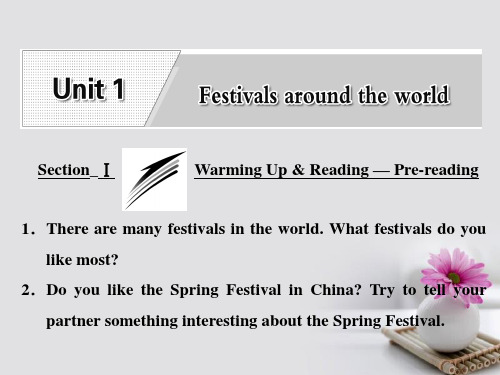
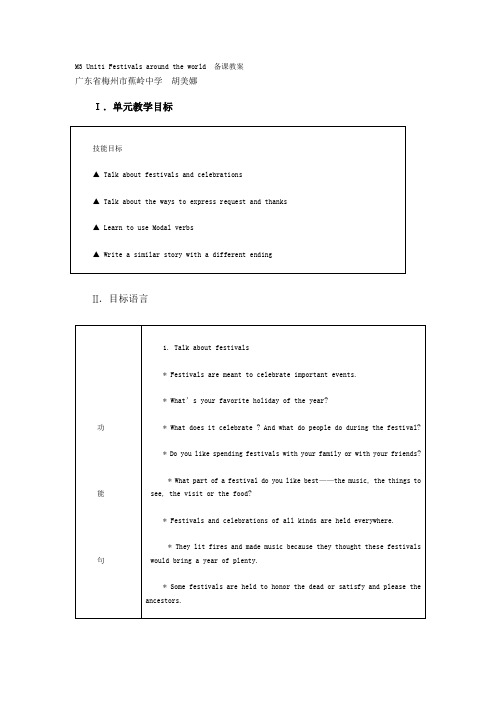
M3 Unit1 Festivals around the world 备课教案广东省梅州市蕉岭中学胡美娜I.单元教学目标II.目标语言III. 教材分析与教材重组1. 教材分析本单元以节日为话题,介绍古今中外节日的种类、由来、意义以及人们的活动和习俗,旨在通过本单元的学习使学生不但了解我国的节日,而且对外国的节日也有所了解,进而拓展社会文化背景、增加跨国文化知识;使学生复习和巩固运用请求和感谢的表达法,掌握情态动词的用法;并尝试根据阅读的文章写一个不同的结局,能表达自己的观点和想法。
1.1 W arming Up 旨在通过表格引导学生讨论并列举出五个我国节日的日期、庆祝内容和民俗。
可以刚刚过去的春节为话题导入对节日的讨论;使他们由自己的经历谈起,扩展到别的节日以及外国的重要节日,激发学生的兴趣,激活他们关于节日的背景知识,为本单元的学习做准备。
1.2 P re-reading是Reading 的热身活动。
主要通过两个问题引导学生思考并讨论自己最喜欢的节日及欢度方式,进而了解学生对节日的认识,以便为阅读作好铺垫。
1.3 R eading 的五篇小短文分别介绍古代节日、亡灵节、纪念名人的节日、丰收节、春天的节日等,使学生了解各种节日的由来及其存在的意义。
此部分载有Festivals的重要信息,还呈现了大量的词汇和主要的语法---情态动词的用法。
处理时应作为重点、整体处理,通过上下文来教词汇、语法,并引导学生分析长句、难句和复杂句。
1.4 Using Language 是英语听说读写的全面运用的练习。
①L istening 是课文的延伸,通过听几位学生参加Trinidad Carnival 节日游行的两段对话,使学生体会参加节日游行的真实情景,既训练听力一通过问题训练了他们的分析能力。
②Reading 是发生在情人节的一个令人伤心的爱情故事,其中又插入了一个“七巧节”的故事。
阅读后的讨论不仅帮助学生理解文章主旨大意,更重要的是让学生学会寻求解决问题的方法。
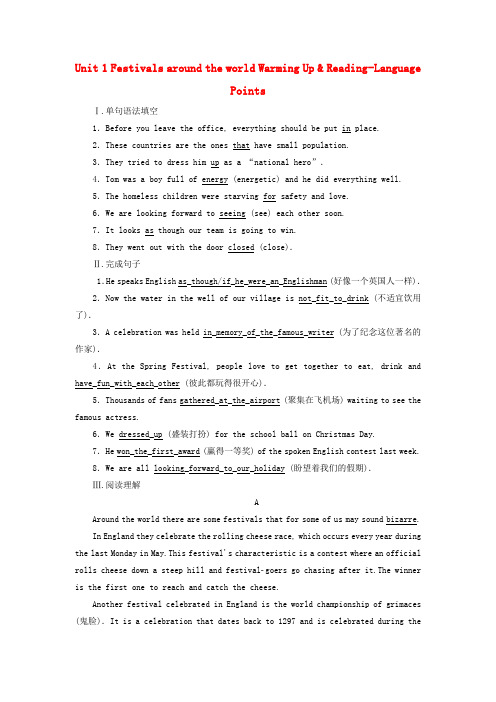
Unit 1 Festivals around the world Warming Up & Reading-LanguagePointsⅠ.单句语法填空1.Before you leave the office, everything should be put in place.2.These countries are the ones that have small population.3.They tried to dress him up as a “national hero”.4.Tom was a boy full of energy (energetic) and he did everything well.5.The homeless children were starving for safety and love.6.We are looking forward to seeing (see) each other soon.7.It looks as though our team is going to win.8.They went out with the door closed (close).Ⅱ.完成句子1.He speaks English as_though/if_he_were_an_Englishman (好像一个英国人一样).2.Now the water in the well of our village is not_fit_to_drink (不适宜饮用了).3.A celebration was held in_memory_of_the_famous_writer (为了纪念这位著名的作家).4.At the Spring Festival, people love to get together to eat, drink and have_fun_with_each_other (彼此都玩得很开心).5.Thousands of fans gathered_at_the_airport (聚集在飞机场) waiting to see the famous actress.6.We dressed_up (盛装打扮) for the school ball on Christmas Day.7.He won_the_first_award (赢得一等奖) of the spoken English contest last week.8.We are all looking_forward_to_our_holiday (盼望着我们的假期).Ⅲ.阅读理解AAround the world there are some festivals that for some of us may sound bizarre.In England they celebrate the rolling cheese race, which occurs every year during the last Monday in May.This festival's characteristic is a contest where an official rolls cheese down a steep hill and festivalgoers go chasing after it.The winner is the first one to reach and catch the cheese.Another festival celebrated in England is the world championship of grimaces (鬼脸).It is a celebration that dates back to 1297 and is celebrated during themonth of September.The task is to perform the best grimace using anything you can to win.The worldwide championship of wife lifting is celebrated in Finland.The game is based on Viking traditions where a man should carry away his neighbour's wife.According to the rules, any woman above 17 is considered as a wife, so if you are within this age, take care while visiting this country during the month of July.Many of you have watched Pirates of the Caribbean and have known something about pirates.The 19th of September has been declared worldwide as the day to talk like a pirate.Plenty of people have celebrated it thanks to the publicity (宣传) on the Internet.First staged in 1998, the Boryeong Mud Festival is an attraction that pulls more than a million visitors to the South Korean city.As you all know, the town is said to be rich in minerals, so there is no shortage of mud.Mud is trucked onto Daecheon Beach for tourists and locals to enjoy the festival to their best.The Monkey Buffet Festival is held in Thailand to develop tourism.It's an annual feast held for about 600 monkeys.The Monkey Buffet Festival is held in honor of the Hindu gods Ram and Hanuman and involves 3,000 kilograms of vegetables and fruits being laid out for monkeys to stuff themselves.语篇解读:本文向我们介绍了世界各地一些奇特的节日。
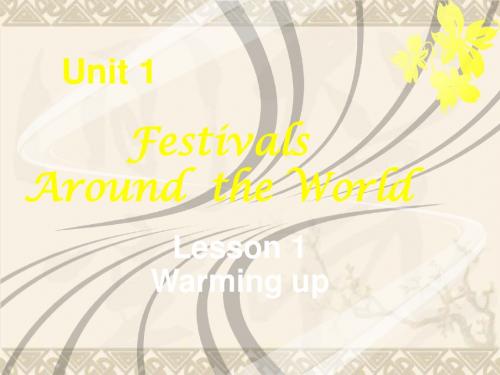

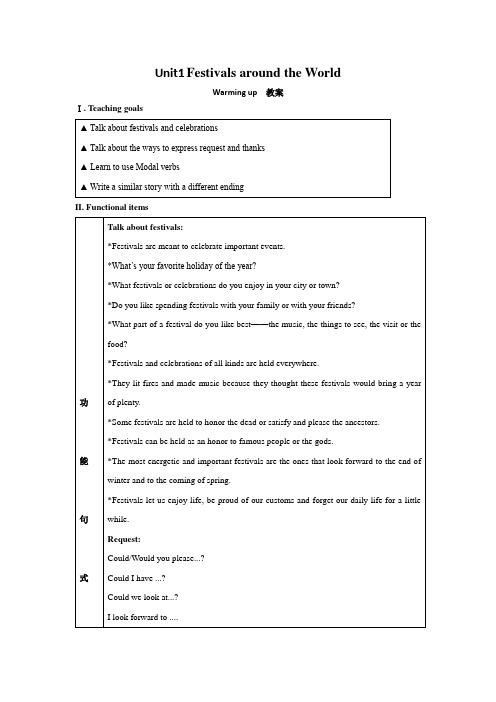
Unit1Festivals around the WorldWarming up 教案I. Teaching goalsII. Functional itemsPeriod 1 Warming up and readingTeaching goals1.To get the students to talk about festivals2.To learn about how festivals begin and how to celebrate festivals so as to enable them to learn more about different cultures while learning different language3.To develop the stude nts’ reading skills : skimming, scanning, summarizing, and finding out details.4.To arouse the students’ interest in festivals, cultures, especially those in China,thus promote their culture awareness.Important pointsprehension of the reading part.2.Knowledge accumulation of festivals and cultures.eful words and expressions concerning festivals.Teaching aidsA computer, a projector, courseware, a tape-recorderTeaching proceduresStep 1 Lead-inFree Talk: Did you have a good time in your winter holidays?When did you feel most happy and excited? Why?( At the Spring Festival. Because it's the most important festival in our country....)Step 2 Warming up1. Let the Ss think about the other Chinese festivals.( Lantern Festival, Pure Brightness Festival, Dragon Boat Festival, Mid-Autumn Festival, New Year's Day, Chung Yeung Festival....)2. Discussion One1)Let the Ss look at the information about Chinese festivals and discuss another four Chinese festivals according to the example in warming up: When does the festival come?What do people celebrate?What do people do?2) Let the Ss fill in the form in the warming up and ask some to share their opinions with the whole class.3 Discussion TwoTalk about some foreign festivals.( Christmas, April Fools Day, Easter Day, Halloween, Valentine's Day, Thanksgiving Day, Obon...)Step 3 discussionLet students think about the questions:1) What is your favourate holiday of the year? Why?2)What festivals or celebrations do you enjoy in your city or town? Do you like spending festivals with your family or with friends? What part of a festival do you like best- the music, the things to see, the visits or the food?Step 4 Language points1.mean2.take placeHomeworkpreview reading。
Festival around the world单元教案人教版新课标必修 3 unit 1教材分析和教材重组教材分析本单元以节日为话题,介绍了世界各地的一些节日、含义、由来和民俗。
通过本单元的学习,可以帮助学生更多地了解节日、体味文化;同时又能教育学生理解、尊重不同的文化和习俗。
通过本单元的语言技能训练,要求学生学会使用请求以及感谢的表达法。
1. Warming Up 要求学生以小组形式完成一个表格填充,列出中国的五个节日和这些节日的时间、庆祝的内容以及节日里人们的所作所为。
激发学生的阅读兴趣,为本单元Reading部分的世界节日做好铺垫。
2. Pre-reading 通过若干个问题了解学生对节日的认识,比如:你最喜欢的节日是什么?你喜欢与家人还是与朋友共度佳节?你喜欢节日的哪部分——音乐、拜访朋友,可看的还是可吃的?3. Reading 由五篇小短文组成,分别介绍古代节日、亡灵节、纪念名人的节日、丰收节和春天的节日等,使学生了解节日的由来及其存在的意义。
最古老的节日主要庆祝冬天的结束,春天的播种,秋天的收获等。
鬼节是为祭奠亡灵,取悦祖先而举行的节日,例如日本的盂兰盆节(Obon),墨西哥的亡灵节,万圣节(Halloween)等。
纪念名人的节日有中国的端午节,美国的哥伦布日,印度的甘地纪念日。
春天的节日包括中国的春节,西方的狂欢节、复活节,日本的樱花节。
4. Comprehending 第一部分提出的6个问题让学生对所读文章有一个浅层理解。
第二部分要求学生讨论哪些节日是最重要的,哪些是最有趣的,结合所读文章和自己的想法填表。
第三部分要求找出各个节日中共有的三件事,然后与同伴讨论为什么这些事情对各地的人们都是重要的。
这一任务不仅使学生重温所读文章的内容,而且结合他们的实际,给学生机会阐述自己的想法和观点,挖掘学生的思维潜力。
这3个练习的设置由表及里,由浅入深,非常科学。
5. Learning about Language 主要突出本单元的重点词汇和主要语法项目。
Unit 1 Festivals around the world Section Ⅱ Warming Up & Reading-Language Points Ⅰ.单句语法填空 1.Awarded (award) the first prize in the competition, he felt happy and satisfied. 2.In order to go to the palace ball, the pretty girl is dressing herself up carefully. 3.I think it's impolite to play a trick on others just for fun. 4.The Spring Festival is coming. I'm looking forward to returning (return) home. 5.If the task is difficult to_finish (finish) on time, you need to ask for help. 6.Either the workers or the boss usually likes (like) eating in this restaurant for lunch. 7.The top of the mountain, covered (cover) with snow, looks beautiful in the distance. 8.The free expressive movements of modern dance were clearly influenced by the beauty (beautiful) of nature. 9.Every year people all over the country hold different celebrations (celebrate) to honour the great day. 10.On his arrival (arrive) in Beijing, Mr. Brown called Lucy and requested her to see him. Ⅱ.阅读理解
Sweetest Day is celebrated on the third Saturday in October as a day to make someone happy. It is an occasion which offers all of us an opportunity to remember not only the sick, the aged, and children who have lost their parents, but also friends, workmates, relatives and neighbors whose helpfulness and kindness we have enjoyed. Over 60 years ago, when a Cleveland man noticed that some people, such as children who lost their parents and patients who lay in bed, too often felt forgotten and neglected(忽视), he developed in his mind the idea of showing them that they were remembered. He did this by giving them small gifts. With the help of his friends and neighbors, he gave those people small gifts on a Saturday in October. During the years that followed, other Clevelanders began to take part in the celebration, which came to be called “Sweetest Day”. Over time, the Sweetest Day idea of spreading cheer to the poor, the sick and children who had lost their parents was broadened to include everyone, and became an occasion for remembering others with a kind act or a small gift. Soon the idea spreaded to other cities all over the USA. Sweetest Day is not based on any single group'sreligious beliefs or on a family relationship. It is a reminder that a thoughtful word or deed enriches life and gives it meaning. Because for many people remembering takes the form of gift giving, Sweetest Day offers us the opportunity to show others that we care, in a positive(积极的) way. 【文章大意】 文章介绍了美国的一个特别的节日(Sweetest Day)的由来,鼓励人们向周围的人展示自己的爱心。 1.What can we learn from the first paragraph? A.Sweetest Day is a day to make others happy. B.Sweetest Day is just an occasion to care about disabled people. C.Sweetest Day is an occasion for lovers to express love. D.Sweetest Day is celebrated on the third Sunday in October. 解析:A 细节理解题。由第一段第一句可知,Sweetest Day就是让他人高兴的一天。 2.Which of the following has little relationship to Sweetest Day? A.Visiting sick people in hospital. B.Visiting children who have lost their parents. C.Giving friends small gifts. D.Giving flowers to sweethearts. 解析:D 推理判断题。由整篇文章的叙述可知,在Sweetest Day这一天,人们要记住病人、老人、孤儿、朋友、同事、家人和邻居,因此A、B、C三项的叙述符合文意,而D项(给爱人送花)并没有提及。 3.What is Cleveland? A.An island. B.A country. C.A village in England. D.A city in America. 解析:D 推理判断题。第二段第一句提到了a Cleveland man,第二段最后一句提到了the idea spreaded to other cities all over the USA,由此推出克里夫兰(Cleveland)是美国的一个城市。 4.What do most people usually do to show their care to others according to the passage? A.They give money. B.They give gifts. C.They send regards. D.They offer help. 解析:B 细节理解题。由第一段和第二段的叙述可知,大多数人在Sweetest Day主要通过送礼物来表达对他人的关心。 Ⅲ.完形填空 When I was ten, my parents felt proud of me when I received a good mark at school. So, I spent most of my time __1__ and I always felt afraid that I wouldn't perform well, which __2__ my parents. I had no friends and it seemed that I __3__ to be a happy person. When I grew up, I thought a good salary and a better position were what I __4__. I was a selfish person and I was lonely. My life seemed to be a __5__. One day, an old man in __6__ clothes knocked at my door and asked me to give him some food. He was dirty, __7__ and thirsty and his eyes were filled with __8__. So, I helped him. I gave him some milk and bread. These were all the things that I could __9__ him that day. But he showed me his gratitude (感谢), his __10__ as well as his happiness. His smile also made me happy and everything negative inside me __11__. That feeling was __12__. And that old homeless man taught me the __13__ meaning of happiness and also changed me. Happiness doesn't mean high marks or a good __14__. Happiness means that you receive __15__ and give it to someone who needs it. Since I changed myself in a(n) __16__ way, many people were __17__ to play with me. I also took part in some charity activities to help people __18__ . And I realize __19__ someone's day is one of the